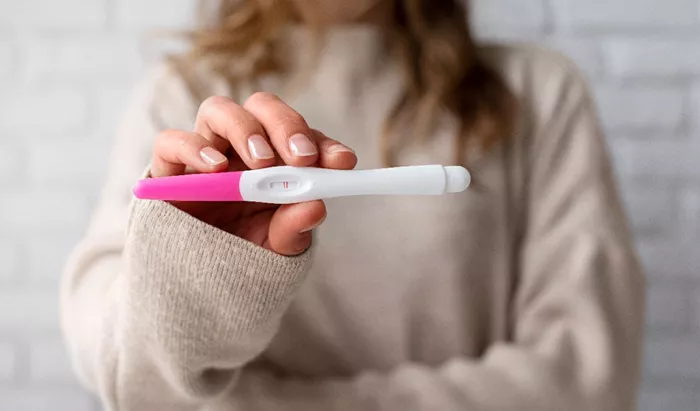Pregnancy is a life-changing experience for women. It is a time of great joy and anticipation, as well as physical and emotional changes. One of the most significant signs of pregnancy is a missed period. However, there are other signs and symptoms that can indicate pregnancy. In this article, we will explore the 7 signs that a woman is pregnant.
7 Signs Of Early Pregnancy
Missed Period: A missed period is often the first sign of pregnancy. This occurs when the fertilized egg implants in the uterus and begins to grow. The body stops producing hormones that cause menstruation, resulting in a missed period. However, it is important to note that some women may experience irregular periods or spotting during pregnancy, so a missed period alone is not a definitive sign of pregnancy.
Nausea and Vomiting: Nausea and vomiting are common symptoms of pregnancy, particularly in the first trimester. This is often referred to as morning sickness, although it can occur at any time of the day. Hormonal changes in the body can cause nausea and vomiting, which can be managed with dietary changes and medications.
Breast Changes: Pregnancy can cause changes in the breasts, including tenderness, swelling, and darkening of the nipples. This is due to hormonal changes in the body that prepare the breasts for breastfeeding. Some women may also experience leakage from the breasts during pregnancy.
Fatigue: Fatigue is a common symptom of pregnancy, particularly in the first trimester. Hormonal changes in the body can cause feelings of exhaustion and sleepiness. Women may need to rest more frequently during pregnancy to manage fatigue.
Frequent Urination: Pregnancy can cause an increase in the frequency of urination. This is due to hormonal changes in the body that cause the kidneys to produce more urine. As the uterus grows, it can also put pressure on the bladder, causing the need to urinate more frequently.
Food Cravings and Aversions:Pregnancy can cause changes in taste and smell, leading to food cravings and aversions. Some women may crave certain foods or have a strong aversion to others. These changes are due to hormonal changes in the body.
Mood Swings: Pregnancy can cause changes in mood and emotions, leading to mood swings. Hormonal changes in the body can cause feelings of sadness, irritability, and anxiety. It is important for women to seek support and care during this time to manage their emotional well-being.
Early pregnancy preparation
Start Taking Prenatal Vitamins: Taking prenatal vitamins before and during pregnancy is essential for the health of both the mother and the developing baby. Prenatal vitamins contain folic acid, iron, and other nutrients that are important for fetal development. Women should start taking prenatal vitamins at least three months before trying to conceive.
Eat a Healthy Diet: A healthy diet is important for both the mother and the developing baby. Women should eat a variety of fruits, vegetables, whole grains, and lean proteins. They should also avoid foods that are high in sugar, salt, and saturated fats. A healthy diet can help prevent complications during pregnancy, such as gestational diabetes and high blood pressure.
Exercise Regularly: Regular exercise can help women maintain a healthy weight and reduce the risk of complications during pregnancy. Women should aim for at least 30 minutes of moderate exercise, such as brisk walking or swimming, most days of the week. However, it is important to consult with a healthcare provider before starting or continuing an exercise routine during pregnancy.
Quit Smoking and Avoid Alcohol: Smoking and alcohol use can have harmful effects on the developing baby. Women should quit smoking and avoid alcohol before and during pregnancy. They should also avoid exposure to secondhand smoke and limit their caffeine intake.
Manage Chronic Conditions: Women with chronic conditions, such as diabetes or hypertension, should work with their healthcare provider to manage their condition before and during pregnancy. This can help prevent complications and ensure a healthy pregnancy.
Get Regular Check-Ups: Regular prenatal check-ups are important for monitoring the health of the mother and the developing baby. Women should schedule their first prenatal appointment as soon as they suspect they are pregnant. During prenatal appointments, healthcare providers will monitor the baby’s growth and development, check for any potential complications, and provide guidance on prenatal care.
Conclusion
There are various signs that a woman is pregnant, including a missed period, nausea and vomiting, breast changes, fatigue, frequent urination, food cravings and aversions, and mood swings. If you suspect that you may be pregnant, it is important to take a pregnancy test and consult with a healthcare provider. They can provide guidance on prenatal care and support throughout your pregnancy journey.
Related topics
- Night Sweats 3 Months After Pregnancy: Causes & Treatments
- Early Warning Signs Of Gallbladder Problems: Symptoms & Diagnostic Approachesearly
- A Comprehensive Guide: When Does the Tummy Start Showing During Pregnancy?


